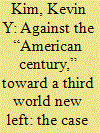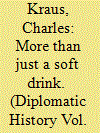|
|
|
Sort Order |
|
|
|
Items / Page
|
|
|
|
|
|
|
| Srl | Item |
| 1 |
ID:
164276


|
|
|
|
|
| Summary/Abstract |
Few Americans are so unknown yet emblematic of U.S.-Asia relations as the journalist Helen Mears. Lauded by contemporaries as a perceptive observer of Asia, Mears died in 1989 in relative obscurity. That seemed unlikely early in Mears’s career. At the age of twenty-nine, Mears became assistant editor for the liberal monthly, Survey Graphic. With graphic artist Rea Irvin and other luminaries, Mears helped found The New Yorker. Traveling across the Americas, Africa, and Eurasia—including third-class passage on the Trans-Siberian railway, a daring voyage in its day—Mears wrote for Fortune, Christian Science Monitor, and other leading periodicals. Invoking these experiences, Mears published two widely read books in the heyday of the “American Century.” British diplomat and Japan authority George Sansom proclaimed her first book, Year of the Wild Boar, the most “penetrating” English-language study of Japan yet published. Amid a recent renaissance of Mears’s work in Japan, historians Naoko Shibusawa and Richard Minear respectively called her second book, Mirror for Americans, “clear-eyed, rational, and unsentimental” and “the most important book” on Japan from the 1940s
|
|
|
|
|
|
|
|
|
|
|
|
|
|
|
|
| 2 |
ID:
164271


|
|
|
|
|
| Summary/Abstract |
One of the most compelling critiques of the impact of new technologies on modern culture and politics makes this observation: “When a population becomes distracted by trivia, when cultural life is redefined as a perpetual round of entertainments, when serious public conversation becomes a form of baby-talk, when, in short, a people become an audience and their public business a vaudeville act, then a nation finds itself at risk; culture-death is a clear possibility.”1 This critique seems apt for our contemporary world, given the ways the Internet has degraded public discourse, undermined the daily newspaper as a watchdog on the powerful, challenged the integrity of education, and dramatically shifted the trajectory of American presidential leadership.
|
|
|
|
|
|
|
|
|
|
|
|
|
|
|
|
| 3 |
ID:
164274


|
|
|
|
|
| Summary/Abstract |
Writing for the New York Times Magazine in 1928, journalist Eunice Fuller Barnard described the dramatic expansion of transatlantic student travel from the United States to Europe in the years since the First World War. Whereas “gilded youth used to go by twos and threes with parents or tutor,” she wrote, now American youth “gilded and ungilded, moves Europe-ward in mass formation, sometimes hundreds in a party, with all the enthusiasm of a college cheering section.” There “are so many bureaus of student travel,” continued Barnard, “that they are constantly getting their mail mixed up.”1 With established tourist companies adding student departments and “student tour-conducting” appearing “almost over night” as a highly-profitable vacation occupation, Barnard knew that in the 1920s American student travel abroad was big business.2 And the man credited with beginning it was the 1924 Yale graduate, James Stanton Robbins
|
|
|
|
|
|
|
|
|
|
|
|
|
|
|
|
| 4 |
ID:
164273


|
|
|
|
|
| Summary/Abstract |
In the early Cold War, the production, dissemination, and control over scientific-technological knowledge became a central concern of the fledgling national security state. Soviet scientific and technological achievements posed a severe threat to American military power and global political hegemony. Maintaining the United States’ competitive edge required both a major injection of federal resources to stimulate the national Research and Development (R & D) system, and a clamp down on the international circulation of knowledge, including the travel of scientists in both directions across the U.S. border. The U.S. security agencies began to monitor the international travel of scientists in order to control the knowledge they carried in their heads and in their hands. Passport denials and restrictions became one of the main instruments of control and surveillance.
|
|
|
|
|
|
|
|
|
|
|
|
|
|
|
|
| 5 |
ID:
164272


|
|
|
|
|
| Summary/Abstract |
“How Would You Like to Go to Africa?” beckoned a headline in Boys’ Life, the official Boy Scouts of America magazine, in March of 1928.1 George Palmer Putnam, a noted New York publisher and publicist, Honorary Scout, and sometime explorer, was looking for new authors for his “Boys’ Books by Boys” series, in which young adventurers wrote accounts of their travels for juvenile audiences. After sorting through some two hundred applications, a selection committee made up of Putnam, Colonel Theodore Roosevelt Jr., and Chief Scout Executive James E. West had found their young men.2 That summer, three talented Eagle Scouts—Robert Dick Douglas Jr., David R. Martin Jr., and Douglas Oliver—would accompany celebrity explorers Martin and Osa Johnson on safari in Kenya and British-administered Tanganyika, and in October the boys appeared as the authors of Three Boy Scouts in Africa.3 The book was a roaring success, selling around 125,000 copies in less than a year.4 It even had a special school edition, as well as translations into French, Dutch, German, Swedish, Danish, Czech, and Hungarian.
|
|
|
|
|
|
|
|
|
|
|
|
|
|
|
|
| 6 |
ID:
164278


|
|
|
|
|
| Summary/Abstract |
In May 1967, Abba Eban, Israel’s foreign minister, visited Washington. Israel was on the brink of the Third Arab–Israeli War, and Eban’s mission was to secure U.S. support for Israel in the coming war. Before coming to Washington, he had met with President Charles de Gaulle in Paris, who, fearing that the conflict might start World War III, proposed to Eban the idea of convening talks among “the four great powers” to prevent the war. When Eban explained de Gaulle’s proposal, President Lyndon B. Johnson irritably retorted, “What did he mean by ‘the four great powers’? Who the hell are the other two?”1
|
|
|
|
|
|
|
|
|
|
|
|
|
|
|
|
| 7 |
ID:
164275


|
|
|
|
|
| Summary/Abstract |
The beverage and cultural icon known as Coca-Cola returned to the People’s Republic of China (PRC) in January 1979. The month prior, the Coca-Cola Company and the Chinese government had brokered a bombshell agreement, which ended a thirty-year ban on the beverage on the Chinese mainland.1 Bringing the world’s most popular soft drink back to the world’s most populous country, the deal appeared telling of the positive state of Sino-American relations and China’s political and economic trajectory.2 The two countries had just formally established diplomatic relations and were intent on further consolidating ties, while Deng Xiaoping, having risen to preeminence within the Chinese Communist Party (CCP), was rolling out much needed reforms for his country’s economy.
|
|
|
|
|
|
|
|
|
|
|
|
|
|
|
|
| 8 |
ID:
164277


|
|
|
|
|
| Summary/Abstract |
In June 1983, a Harvard study on the impact of computers upon American political campaigns concluded that the technology’s penetration into the world of elections had brought significant advantages for candidates. Alongside their use for managing information bases, assisting in accounting and budgeting, and lightening the load of basic office management, the report identified “intra-campaign communication” and “nearly instantaneous … transfer of information among the widely dispersed staff” as a particular advantage.1 For the first time, press releases, speech drafts, and schedules could be composed, revised, accessed, and printed via remote terminals. While the report identified that the Republican National Committee (RNC) held a significant advantage over their Democratic National Committee (DNC) opponents in the adoption and application of this new approach, it noted the Democrats, intense efforts to catch up and duplicate the Republicans, revealing the birth of computer-driven campaign management.
|
|
|
|
|
|
|
|
|
|
|
|
|
|
|
|
|
|
|
|
|